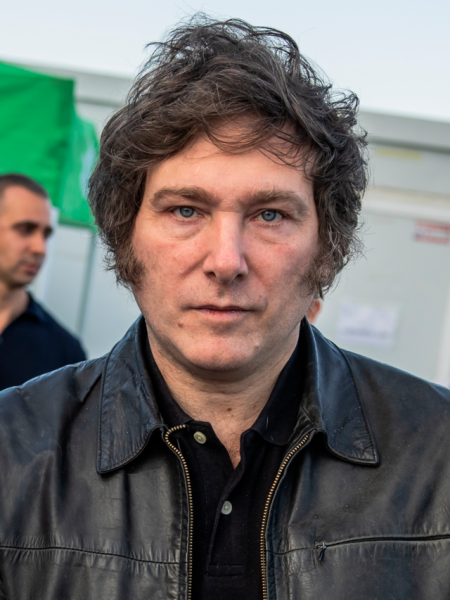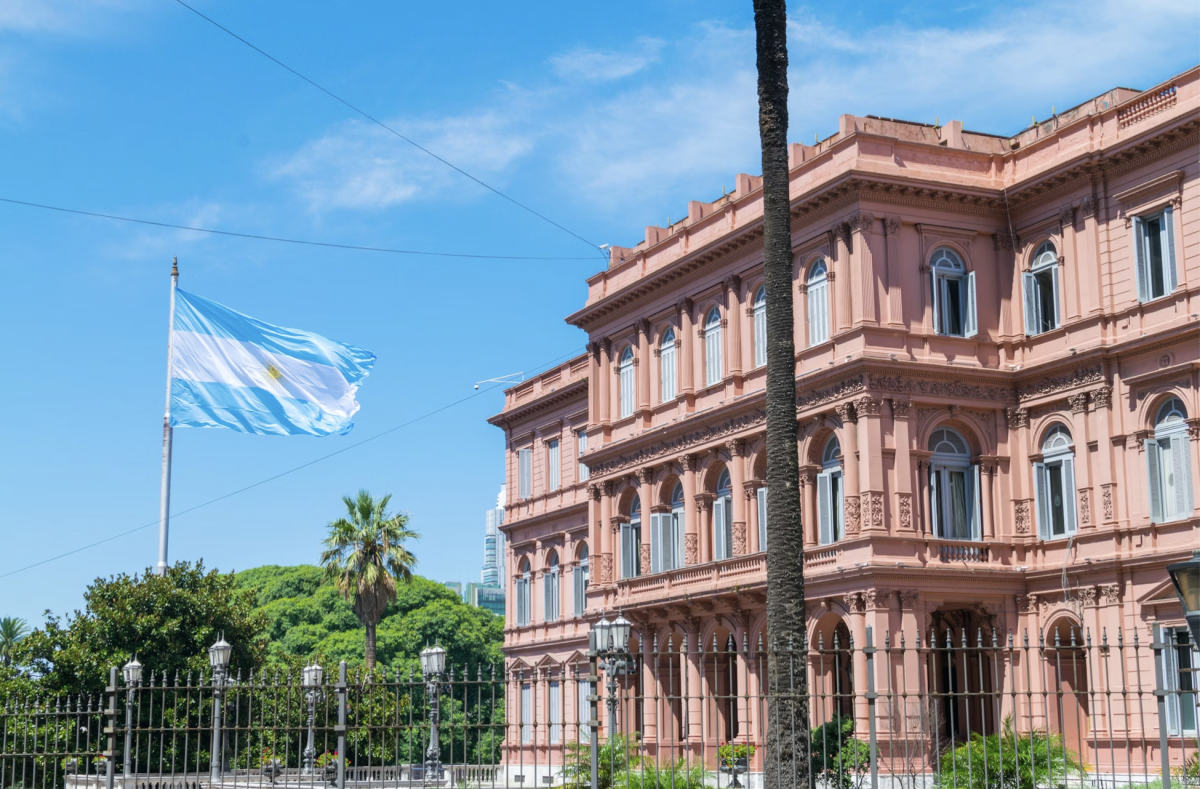Milton Friedman. Murray Rothbard. Robert Lucas Jr.. These names are some of America’s most famous libertarian economists, known for championing the ideas of free-market capitalism with minimum regulation. However, these also happen to be the names of his four genetically identical dogs (Milton, Murray, Robert, and Lucas) belonging to Argentina’s recently elected president, Javier Milei.
When Milei was elected in December 2023, his first speech was a thank you to those who had helped him get to where he is. He thanked Milton, Murray, Robert, and Lucas. “Who else?” he claimed as he gestured towards his dogs, the four loves of his life. However, Milei was not only thanking his four dogs, all of which he had cloned from his first dog, but the economists themselves, Milton Friedman, Murray Rothbard, and Robert Lucas Jr., whose libertarian policies got him elected.
Milei was born in 1970 in Buenos Aires, Argentina. Before becoming president, he was an economist and political scientist with a specialization in macroeconomics. Soon after beginning his studies, Milei started to identify as an anarcho-capitalist, someone who believes that society functions better without a state than with a state.
Milei’s campaign was centered around the idea that Argentina is in need of drastic change. With soaring inflation rates, weak currency, and a large debt burden, Argentina is in desperate need of economic relief.
Maybe Argentinian citizens thought to themselves: Perhaps Milei will be Argentina’s savior? Or maybe its demise, as journalists and economists point out the similarities between Milei and former President Donald Trump, also known for his radicalism and desire to make change.
Bronx Science Argentinian student Daniela Rusconi ’25 said, “Watching President Milei’s actions, it’s hard not to feel worried. His drastic measures and promises of reform seem more like a recipe for more hardship than a path to improvement. It feels like we’re being pushed into uncertainty without a clear plan for how everyday people will cope. It’s a tough time, and I can’t help but think his approach might do more harm than good.”

Similar to President Trump, Milei was not initially introduced to Argentina as a serious candidate; he was originally known as a television personality. Similar to President Trump’s “orange” skin, Milei became known for his hair, an eccentric hairdo that made him stand out in a crowd, appealing to those looking for excitement within politics. His appeal lies not just in his promises for economic reform, but also in his outsider status and his critique of the political establishment.
As Milei began to gain popularity, fame, and attention, he focused his campaign around a promise to replace the Argentine Peso with the U.S. Dollar, a move that, once elected, caused Milei to lead a plummet in the value of the peso and an increase in inflation.
The results proved promising, as his critical stance towards the peso caused the peso’s value to fall dramatically in response to his primary election victory. With this economic shift, Milei began rallying supporters, those similar to those who support President Trump (radicals, libertarians, anarchists), and began proposing slashing government spending, privatizing state companies, and overhauling the government’s structure. To his supporters, Milei represents a needed break from the status quo and a chance to disrupt a system they see as corrupt and ineffective. His unconventional approach, combined with his direct and often controversial style, has endeared him to those who feel ignored or disenfranchised by traditional politicians.
Moreover, Milei’s ascent signifies more than a local political upheaval; it is indicative of a broader regional and global shift in political sentiments. The success or failure of his libertarian approach in a traditionally left-leaning Latin America could significantly influence political discourses and policies across the region. The global community watches closely, recognizing that the country’s choice will have far-reaching implications beyond its borders.
Prior to Milei, Argentina had a rather left leaning economic policy as the country had a strong centralized government, higher taxes, and reluctance to tackle inflation. It comes as no surprise that Milei’s proposals are met with skepticism and concern, given their radical nature and the challenges they will potentially face in implementation. As Argentina grapples with its economic instability and the potential implications of Milei’s presidency, the nation stands at a crossroads, with its political and economic future hanging in the balance.
Although Milei’s supporters rally around him and revel in his glory, he has also received numerous accusations that he is destabilizing the economy for political gain, accusations that President Trump used against Democrats who question his shift in political ideologies. Milei’s economic proposals may prove to be extremely challenging to implement due to potential resistance in Congress and the need for significant financial resources – resources that Argentina does not have.
The inflation rate in Argentina has surpassed 140 percent annually. In order to fix this, Milei claims to want to cut spending and taxes, privatize state companies, eliminate 10 of the 18 federal ministries, move public schools to a voucher system, make the public health care system insurance-based, close the nation’s central bank and replace the Argentine peso with the U.S. dollar, a policy that has only proven to make inflation worse.
Milei’s first few months in office are not looking promising, as inflation rose 13% in November to a staggering 25% in December 2023, and projections suggesting a continuance of this trend at around 20% for January and February 2024, the situation is dire. The nation recognizes this crisis as many political leaders in Argentina are refusing to sign off on many of Milei’s reforms.
As of March 3rd, 2024, Milei has taken a bold stance, as despite the soaring inflation Milei wants to proceed with economic reforms. Milei has claimed that he has intention to do this, with or without the backing of the nation’s political leadership.
Milei unveiled his intention to propose a new “social contract” underpinned by liberal principles, which he calls the “Pacto del 25 de Mayo.” This contract is focused around principles such as the unwavering right to private property, the imperative of maintaining fiscal balance, and the necessity for labor reform, aiming to reshape Argentina in accordance with Milei’s own vision.
Milei’s is taking a head on approach, characterized by his readiness to employ all legal all of his executive power. However, this will prove to be different due to the political gridlock surrounding his deregulation and budget-cutting agenda.
The president’s proposals have met with resistance, evidenced by more than 60 lawsuits from various sectors challenging his reforms and growing labor and social unrest. Despite this, Milei remains committed to his course, promising to reintroduce his comprehensive deregulatory bill to Congress and resorting to presidential decrees if necessary.
Milei’s call for a new social contract seeks to consolidate support for his reforms, reaching out to a broad spectrum of political leaders and inviting them to sign the agreement on a significant national anniversary. This gesture aims to underscore his commitment to change and fiscal responsibility. However, the austerity measures and reforms have sparked controversy and concern among Argentinians, with inflation soaring.
Javier Milei’s emergence as a prominent figure in Argentinian politics is a remarkable development, marking a significant shift in the nation’s political and economic discourse. His transition from a television personality to a presidential contender exemplifies a global trend towards electing populist leaders with radical and often divisive economic ideologies. Milei’s libertarian views embody a drastic departure from Argentina’s traditional economic policies, inciting debates nationwide.
Bronx Science Argentinian student Daniela Rusconi ’25 said, “Watching President Milei’s actions, it’s hard not to feel worried. His drastic measures and promises of reform seem more like a recipe for more hardship than a path to improvement. It feels like we’re being pushed into uncertainty without a clear plan for how everyday people will cope. It’s a tough time, and I can’t help but think his approach might do more harm than good.”

